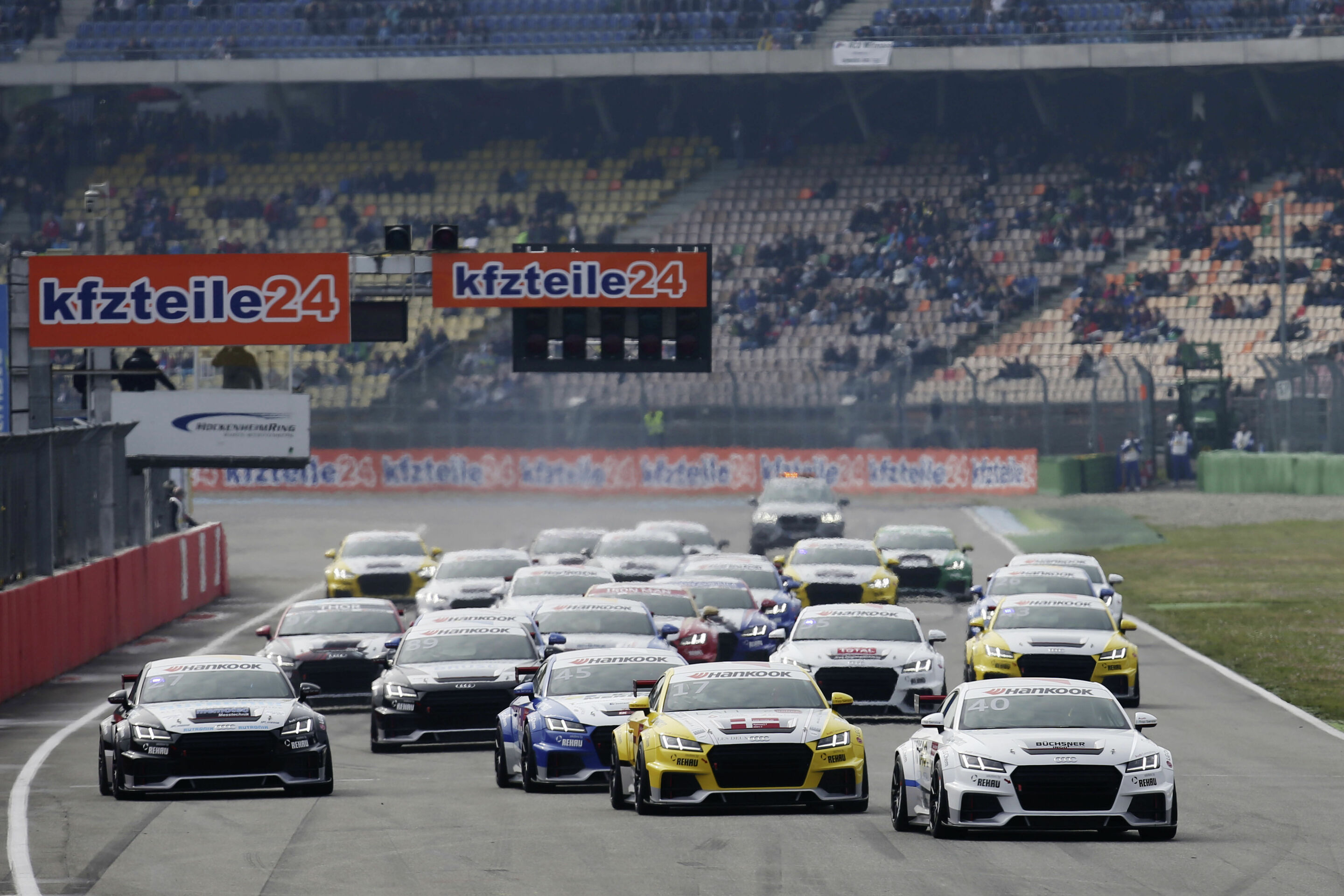Audi Sport TT Cup celebrates successful world premiere at Hockenheim
- New Audi one-make cup thrills crowd at DTM Festival
- Marc Coleselli wins round one in Audi Sport TT Cup
- Project Leader Rolf Michl: “Gripping motorsport”
The Audi Sport TT Cup has gone through its baptism of fire with flying colors. In the world premiere of the Audi one-make cup held as part of the DTM Festival at the Hockenheimring, 24 starters demonstrated the sportiness of the Audi TT* as a racing version. The first race was won by the Austrian Marc Coleselli.
In the new racing series for the Audi TT, the brand with the four rings offers young talents a new opportunity to enter the company’s successful motorsport world. The car’s extremely light body, the four-cylinder TFSI engine and the six-speed transmission have been adopted from the production model nearly unchanged and provide an ideal base for a race car.
Marc Coleselli was the driver prevailing in the historic first race. The 21-year-old from Salzburg (A) won the 13-lap round in front of Nicolaj Møller Madsen (DK) and Dennis Marschall (D). “This was a tremendous inaugural event for the Audi Sport TT Cup,” said Project Leader Rolf Michl. “The crowd saw gripping motorsport and we’re delighted about a second race being scheduled for tomorrow.”
In addition to 18 permanent entrants, six changing guest drivers race in the Audi Sport TT Cup. At Hockenheim, the two-way battle between the rallycross superstars Tanner Foust (USA) and Toomas Heikkinen (FIN) is attracting special attention. Round one of this duel went to Foust, who, in fifth place, secured victory in the guest driver classification as well. The two journalists Christian Gebhardt (D) and Horst von Saurma (D), who have racing experience under their belts, took positions 12 and 16.
Round two of the Audi Sport TT Cup will start on Sunday at 9.40. The race will be broadcast by live streaming on www.audimedia.tv.
– End –
Related video: https://vimeo.com/126362381
*Fuel consumption of the models named above:
Audi TT
Combined fuel consumption in l/100 km: 7.5–4.2;
Combined CO2 emissions in g/km: 174–110
Marc Coleselli was the driver prevailing in the historic first race. The 21-year-old from Salzburg (A) won the 13-lap round in front of Nicolaj Møller Madsen (DK) and Dennis Marschall (D). “This was a tremendous inaugural event for the Audi Sport TT Cup,” said Project Leader Rolf Michl. “The crowd saw gripping motorsport and we’re delighted about a second race being scheduled for tomorrow.”
In addition to 18 permanent entrants, six changing guest drivers race in the Audi Sport TT Cup. At Hockenheim, the two-way battle between the rallycross superstars Tanner Foust (USA) and Toomas Heikkinen (FIN) is attracting special attention. Round one of this duel went to Foust, who, in fifth place, secured victory in the guest driver classification as well. The two journalists Christian Gebhardt (D) and Horst von Saurma (D), who have racing experience under their belts, took positions 12 and 16.
Round two of the Audi Sport TT Cup will start on Sunday at 9.40. The race will be broadcast by live streaming on www.audimedia.tv.
– End –
Related video: https://vimeo.com/126362381
*Fuel consumption of the models named above:
Audi TT
Combined fuel consumption in l/100 km: 7.5–4.2;
Combined CO2 emissions in g/km: 174–110
